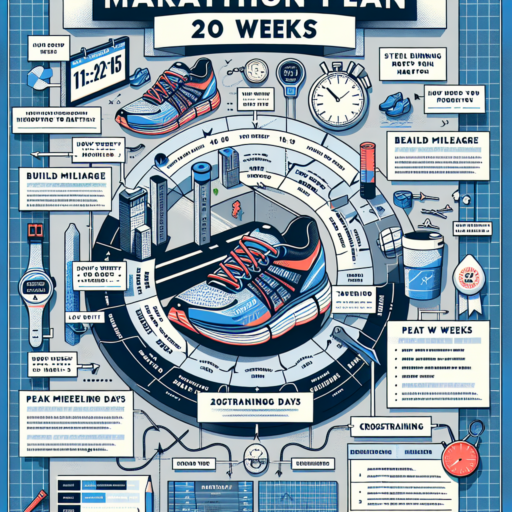Can I train for a marathon in 20 weeks?
Certainly! Training for a marathon in 20 weeks is a realistic and achievable goal for many runners, whether you’re a seasoned athlete or a newcomer aiming to cross your first marathon finish line. The key to success lies in a carefully structured training plan that balances running, rest, and recovery.
First and foremost, it’s crucial to assess your current fitness level. For beginners, this means being able to comfortably run for at least 30 minutes without stopping. If you’re starting from scratch, you may want to spend a few weeks building up to this baseline before diving into a marathon training schedule.
A typical 20-week marathon training plan involves gradually increasing your mileage each week, allowing your body to adapt to the distances while minimizing the risk of injury. It’s common to have one long run per week, which steadily gets longer to prepare your body and mind for the marathon distance. **Rest days** and easier, recovery runs are equally important to prevent overtraining and facilitate muscle repair.
Incorporating strength training and flexibility exercises into your routine can bolster your running performance and resilience. These workouts help in improving your running economy and can reduce your risk of injuries. Moreover, paying attention to your diet and ensuring you’re fueling your body with the right nutrients will support your training and recovery efforts.
Embracing a comprehensive approach that includes a gradual build-up of mileage, proper rest, cross-training, and nutrition will set you on a path towards successfully training for a marathon in 20 weeks. Remember, listening to your body throughout the process is crucial to adapt the training as needed and arrive at the starting line ready and confident.
How many weeks should a marathon training plan be?
When it comes to preparing for a marathon, the length of your training plan is a critical factor that can significantly influence your performance and overall experience. Generally, a typical marathon training plan should span anywhere from 16 to 20 weeks. This timeframe allows runners, whether beginners or more experienced athletes, to gradually increase their mileage, improve endurance, and incorporate necessary recovery periods to prevent injuries.
It’s important to understand that the exact number of weeks can vary based on several factors, including your current fitness level, running experience, and personal goals. For example, a first-time marathoner might need a longer period to safely build up their running capacity, opting for a 20-week program. In contrast, an experienced runner with a solid base might choose a slightly shorter 16-week schedule. Selecting the right duration for your plan is paramount to ensuring you can reach the starting line feeling well-prepared and confident.
In addition to the length of the training plan, incorporating variety into your schedule is key. This means balancing long runs, speed work, cross-training, and rest days to optimize your training without overdoing it. Remember, each week of the plan is a building block towards your goal, designed to gradually increase your physical and mental readiness for the 26.2-mile challenge. Therefore, giving yourself adequate time to adjust, improve, and taper correctly is essential for a successful marathon outcome.
How to train for a marathon plan?
Training for a marathon requires a careful blend of discipline, strategy, and persistence. Whether you’re a seasoned runner or a novice looking to tackle your first marathon, developing a tailored training plan is essential. A marathon training plan typically spans 16 to 20 weeks, gradually building in intensity and mileage to prepare your body and mind for the 26.2-mile challenge.
Creating Your Marathon Training Schedule
When crafting your marathon training schedule, it’s vital to consider your current fitness level, running experience, and lifestyle. Your plan should include varied workouts such as long runs, speed work, cross-training, and rest days to enhance your endurance, speed, and recovery. Incorporating long runs into your weekly routine is crucial, as they help simulate the marathon distance and improve your stamina.
Incorporating Rest and Recovery
Rest and recovery are just as important as the runs themselves. Scheduling adequate rest days is key to preventing injuries and allowing your body to repair and strengthen. Similarly, integrating cross-training activities like cycling, swimming, or yoga can enhance your physical condition while reducing the risk of burnout and overuse injuries.
No se han encontrado productos.
How to train for a marathon in 24 weeks?
Training for a marathon is a commitment that requires time, discipline, and a strategic plan. Embarking on a 24-week training schedule allows your body to gradually adapt to the rigors of long-distance running, minimizing the risk of injury and improving your endurance.
Setting a Solid Foundation
Starting with the basics, it’s crucial to establish a solid running base before ramping up mileage. In the first few weeks, focus on regular, shorter runs to condition your body. Incorporate rest days to allow your muscles to recover and adapt. This phase is about consistency rather than intensity.
Building Mileage Gradually
As you progress, gradually increase the length of your long runs each week. This incremental approach is key to boosting your endurance without overextending yourself. Remember, the goal is to increase weekly mileage by no more than 10% to avoid injury. Alongside your long runs, include speed work and tempo runs to enhance your aerobic capacity and running efficiency.
Effective marathon training is not just about logging miles. Cross-training activities such as cycling, swimming, or yoga can enhance your aerobic fitness while giving your running muscles a break. Similarly, strength training, focusing on core, leg, and back muscles, will support your running form and reduce the risk of injury.




